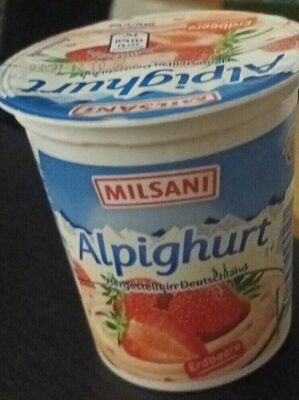
Barcode: 4061458025591
Alpighurt – Erdbeere
HALAL
📝 Reason: All ingredients except ‘flavor’ are plant-based or dairy and correspond to Halal standards as outlined by major Halal organizations (e.g., HFA, IFANCA). The ingredient ‘flavor’ is marked Doubtful due to the possibility of non-Halal alcohol or animal derivatives without specific Halal certification or source details. Islamic teachings (Quran 5:3) prohibit consuming doubtful or Haram items. As at least one ingredient is Doubtful, the entire product is classified as Doubtful (Halal_Result: 2) per strict rules.
🏷️ Category: Dairies, Fermented Foods, Fermented Milk Products, Desserts, Dairy Desserts, Fermented Dairy Desserts, Fermented Dairy Desserts With Fruits, Yogurts, Fruit Yogurts, Strawberry Yogurts
📄 Certificates: Vegetarisch
Ingredients:
Details
Understanding the Halal Status of Alpighurt – Erdbeere
Alpighurt – Erdbeere is a delightful strawberry yogurt that raises important questions regarding its Halal certification. As consumers become increasingly vigilant about dietary laws, it is essential to explore the ingredients and their implications. This post aims to shed light on the Halal status of Alpighurt – Erdbeere and clarify any doubts regarding its consumption.
Halal Status Overview
According to various Halal organizations such as HFA and IFANCA, Alpighurt – Erdbeere is classified as ‘HALAL’, but with a crucial caveat. While most ingredients in this product are compliant with Halal standards, the flavoring component has been marked as ‘Doubtful’. In Islamic teachings, it’s essential to avoid ingredients categorized as doubtful or showing potential Haram elements, leading to careful scrutiny.
Ingredient Breakdown
Let’s examine the ingredients of Alpighurt – Erdbeere to understand their Halal status:
- Mild yogurt: A fermented dairy product that does not typically contain animal rennet; thus, it is considered Halal. This ingredient is a staple in many dairy products.
- Strawberries (10%): Naturally plant-based and Halal, strawberries contribute to the delicious taste without any concerns.
- Sugar: Generally Halal, sugar may be processed with bone char in some regions, but this is rare in Europe.
- Strawberry juice from concentrate (2%): This fruit-based ingredient also meets Halal guidelines, as it does not typically contain Haram additives.
- Modified starch: Usually derived from plant sources and is regarded as Halal.
- Coloring plant concentrates (beetroot, carrot): Both beetroot and carrot colorants are derived from plant sources and are considered Halal.
- Acidity regulators: Citric acid (E330) and sodium citrates (E331) are both Halal, derived from plant sources, and included in many approved Halal lists.
- Flavor: This ingredient presents a challenge. Flavoring can sometimes incorporate animal derivatives or alcohol-based elements, and without specific certification, its status remains ‘Doubtful’.
E-Numbers and Their Status
In addition to the straightforward ingredients, it is beneficial to examine the mentioned E-numbers in the formulation:
- Citric acid (E330): A Halal ingredient, widely accepted for its use in various foods.
- Sodium citrates (E331): This compound, a salt of citric acid, is Halal and approved by the regulatory bodies.
Conclusion: Should You Consume Alpighurt – Erdbeere?
Considering the analysis, Alpighurt – Erdbeere is primarily Halal, but the presence of the ‘Doubtful’ flavoring ingredient poses a significant concern according to strict Halal dietary laws. As Muslims, it is vital to avoid consuming items that incorporate elements marked as doubtful, which is why the definitive status of this product leans towards uncertainty.
In summary, while most components align with Halal regulations, the questionable nature of the flavor ingredient means that full confidence in its Halal status cannot be assured. Therefore, consumers seeking strictly Halal products may want to exercise caution when choosing Alpighurt – Erdbeere. For anyone preferring to adhere strictly to Halal practices, consider looking for products with clearer certifications.
Happy eating, and always remember to check the labels thoughtfully!
